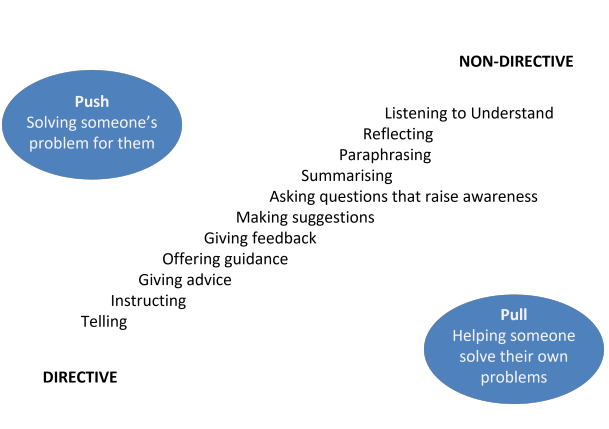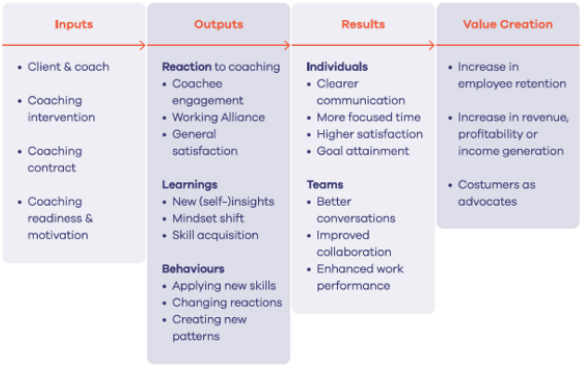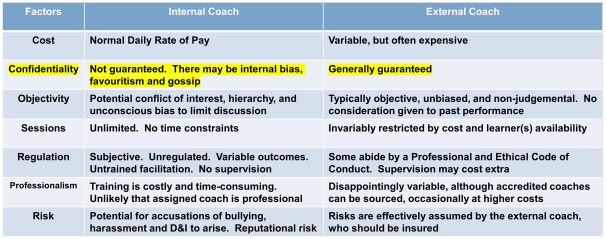Why would anyone outside professional sport need a coach?

By Richard Gadd
The purpose of this article is to inform the reader of the types, sources, advantages, and pitfalls of employing a coach in order to help their future decision making.
False Perceptions
Like so many other professional services today, Coaching is often associated with a number of misgivings amongst business leaders and individual learners:
- I can’t afford to employ a coach
- I haven’t the time, money or inclination to train an internal coach
- Anyone can call themselves a coach these days
- The Coaching Profession is largely unregulated
- Coaches are motivated by profit, and don't actually care if I succeed or fail
- Coaching outcomes cannot be quantified in such a way that I can either justify the expense or make informed comparisons
- Once I commit to coaching, I can't then terminate the contract or switch suppliers
- If I need advice, I’ll ask “my mate Gordon” (Graham Fellows, 1978)
What is Coaching, and How Does it Differ from Mentoring?
Common Types of Coaching
There are numerous ways to differentiate between coaching types, and a cursory glance on Google might tell you that there are "four", "seven", or "fourteen" types, which isn't very helpful. Essentially, one should remember that "Coaching relates primarily to performance improvement (often short-term) in a specific skills area. The goals, or at least the intermediate or sub-goals, are typically set with or at the suggestion of the coach. While the learner has primary ownership of the goal, the coach has primary ownership of the process".
Generally, one might focus on the following:
- Change Coaching
- Solutions Focused Coaching
- Executive Coaching
- Mindfulness Coaching and/or Wellbeing Coaching
- Life Coaching
- Business Coaching
- Neuro Linguistic Programming (NLP) Coaching
What are the Potential Benefits of Coaching
- Improve Return on Investment (ROI)
- Increase profits and/or competitive performance
- Learning new skills
- Leadership
What Does Good Coaching Look Like
There is inevitably a degree of subjectivity involved in selected a coach that best fits your learning needs. For example, some learners might prefer to only work with coaches of a certain age, gender, educational background, level of experience, cultural background, geographic location, etc. Conversely, some organisations will only ever consider employing internal coaches. Clearly, no one size fits all although most might regard the following as critical considerations:
- Face to Face (in person), Remote (video), telephone, or a combination
- Do I require individual or group coaching
- Internal or external coaching
- What is the verifiable Knowledge, Skills, Attitude (Motivation) and Experience of the Coach
- Is the Coach suitably qualified or are they unqualified
- Is the Coach professionally accredited or unaccredited, do they uphold a Code of Conduct, and are they regulated
- Does the Coach have any verifiable, current, and unbiased testimonials and/or recommendations
- Are costs calculated per person, per hour, or per session. Are 'Discovery Calls' free. What are the payment arrangements
Evidence suggests that coaching decisions are increasingly based on cost alone, which most of us might agree completely overlooks the interests of the learner and is akin to comparing apples with oranges
Comparison of Internal and External Coaches
Sourcing a Professional Coach
Not everyone needs or wants an internationally accredited coach, and although the British School of Coaching is one of the most reputable sources of professional coaches in the UK, there are many more national, regional, and local providers to consider:
- European Coaching and Mentoring Council (ECMC)
- Association for Coaching (AFC)
- Association for Professional Executive Coaching & Supervision (APECS)
- The International Coaching Council (ICC)
- Worldwide Association of Business Coaches (WABC)
- British School of Coaching (BSC)
A basic search for "Professional Coaches in North Yorkshire" for example, will identify more than 3.1M 'hits'. Before committing to a coaching relationship of any description, clients are advised to have established a concise selection criteria and to avoid making ill-informed cost comparisons at all costs
Avoid Potential Costly and Damaging ‘Poo Traps’
- Be absolutely clear of the coaching requirement, particularly its primary purpose, duration, preferred means of delivery, audience, and desired outcomes
- Outline your expectations to the Coach, but empower them to agree specified objectives with the 'learner'
- Coaching must neither be perceived as ‘remedial action’ for the weakest nor reward for the strongest
- Select the ‘learner(s)’ with care. Preferably volunteers only and never use Coaching as a form of 'sanction' or punishment for under-performance
- Avoid using existing ‘chain of command’, or any arrangement which might promote unconscious bias, favouritism, discrimination, or unfairness in the workplace
- Promote mutual respect, confidentiality, and avoid judgement
- Never compare Coaches on cost alone, but consider skills, knowledge, attitude, experience, and evidence (testimonials) of delivery
- Conduct all basic precautionary checks and balances, including on social media (LinkedIn and Facebook)
- Agree how and when to measure coaching outputs, and procedure and cost of early termination of Coaching Contract
- Until such a time as a Coach has satisfactorily demonstrated their potential value and trustworthiness, trust no one.
- If you don't like them, don't employ them
September 2023
Would you like to contribute an article towards our Professional Knowledge Bank? Find out more.




